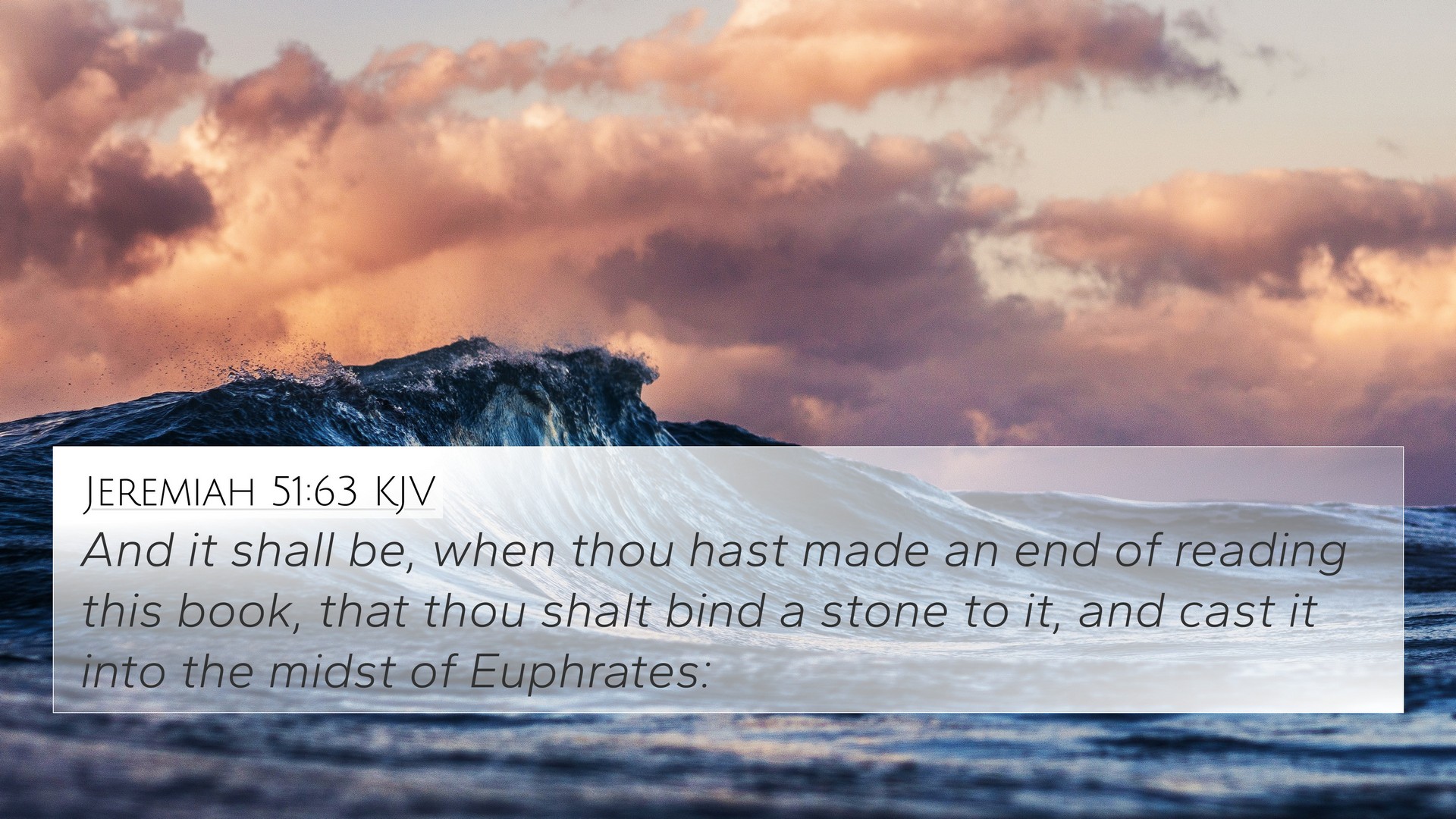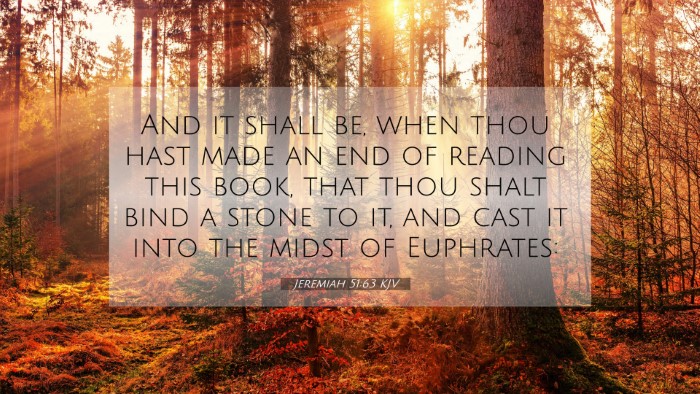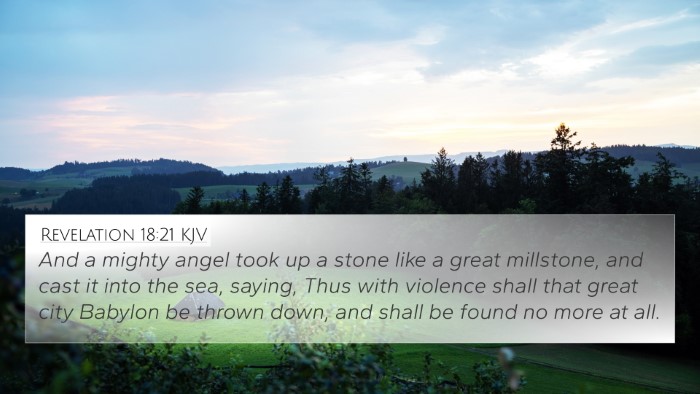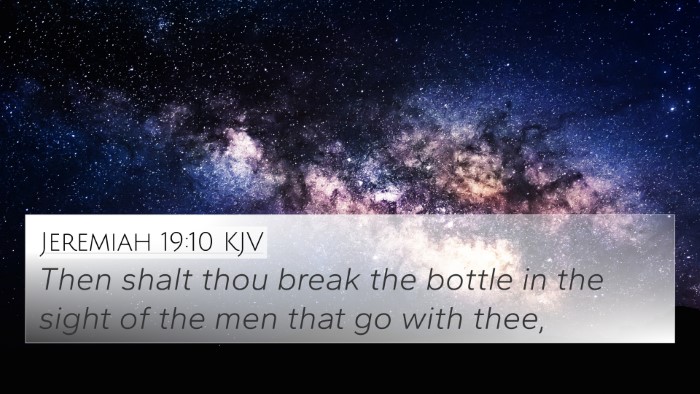Understanding Jeremiah 51:63
Verse Context: Jeremiah 51:63 states, “And it shall be, when thou hast made an end of reading this book, that thou shalt bind a stone to it, and cast it into the midst of Euphrates.” This verse concludes the prophecy against Babylon and encapsulates the entire message Jeremiah delivers regarding the forthcoming judgment on Babylon, emphasizing the permanence of God’s declared judgment.
Summary of Key Insights
Insights from public domain commentaries highlight several key points regarding Jeremiah 51:63:
- Matthew Henry: Henry suggests that this act of binding the book and casting it into the Euphrates serves as a symbolic gesture. It signifies the utter destruction that will come upon Babylon, illustrating that its fall is not only inevitable but irrevocable. This symbolic action also reflects the finality of God's word and judgment.
- Albert Barnes: Barnes emphasizes the importance of the act of reading to the people, suggesting that it serves as a testimony against Babylon. The stone symbolizes the weight of this prophecy, and throwing it into the river signifies that Babylon's glory will sink like a stone, never to rise again.
- Adam Clarke: Clarke interprets this verse as a representation of Babylon's future doom, where the river Euphrates embodies both a literal and metaphorical barrier. He notes that the binding of the book indicates that Babylon’s deeds will be weighed and judged, serving as both a warning and a final declaration of God's judgment.
Symbolism of the Stone and River
The stone represents the permanence of God's decree against Babylon, while the Euphrates symbolizes the boundary of Babylon’s former power. The act of casting the stone into the river introduces a vivid image of finality, showcasing how easily God can dismantle human fortifications and pride.
Inter-Biblical Dialogue
Jeremiah 51:63 can be cross-referenced with several other scriptures, creating a deeper understanding of the themes presented:
- Revelation 18:21: “And a mighty angel took up a stone like a great millstone, and cast it into the sea, saying, Thus with violence shall that great city Babylon be thrown down, and shall be found no more at all.” This parallel emphasizes the violent end of Babylon, reinforcing the imagery from Jeremiah.
- Isaiah 47:1: “Come down, and sit in the dust, O virgin daughter of Babylon, sit on the ground: there is no throne, O daughter of the Chaldeans: for thou shalt no more be called tender and delicate.” This verse speaks to Babylon's fall from grace similarly to the themes in Jeremiah.
- Daniel 5:30-31: “In that night was Belshazzar the king of the Chaldeans slain. And Darius the Median took the kingdom.” This account of Babylon’s fall reinforces the prophetic messages found within Jeremiah.
- Habakkuk 2:6: “Shall not all these take up a parable against him, and a taunting proverb against him?” This reflects the themes of judgment and finality present in Jeremiah.
- Jeremiah 25:9: “Behold, I will send and take all the families of the north, saith the LORD, and Nebuchadnezzar the king of Babylon, my servant.” This demonstrates God using Babylon as an instrument for His purposes, prior to its destruction.
- Revelation 14:8: “And there followed another angel, saying, Babylon is fallen, is fallen, that great city, because she made all nations drink of the wine of the wrath of her fornication.” This New Testament vision speaks to the ultimate judgment of Babylon.
- Jeremiah 46:26: “And I will deliver them to the hand of those that seek their lives, and to the hand of Nebuchadnezzar king of Babylon, and to the hand of his servants.” Another illustration of judgment on Babylon found in Jeremiah.
Thematic Connections
This verse also connects thematically with notions of divine justice and prophetic fulfillment. The symbolism of the stone and the inactivity of Babylon underlines God’s sovereignty over nations.
Bible Cross-Reference Tools
For a deeper study, various tools and methods exist for effective Bible cross-referencing:
- Bible Concordance: A tool to find where specific words or themes are mentioned throughout the Bible.
- Bible Cross-Reference Guide: Helps identify related verses that illuminate a theme further.
- Cross-Reference Bible Study: A method to explore biblical themes by linking related passages across various books.
Identifying Connections
Understanding Jeremiah 51:63 in the broader context of Scripture requires patience and an active pursuit of connections between verses, especially when delving into Old and New Testament relationships.
Tools for Comparative Bible Verse Analysis
Resources like comprehensive study Bibles and online platforms can assist in exploring the cross-referenced themes, allowing for a rich understanding of biblical narratives and prophecies.
Conclusion
In summary, Jeremiah 51:63 serves as a powerful representation of God’s judgment upon Babylon, encapsulated through symbolic gestures that evoke the inevitable fate of a once-mighty empire. By linking this verse with other related scriptures, believers can gain deeper insights into God's justice and prophetic workings throughout history.




